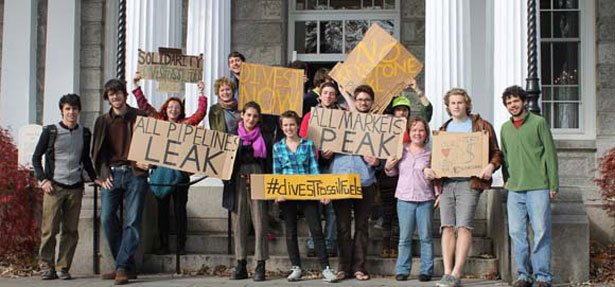
This weekend, from February 22 to 24, nearly 200 students from dozens of colleges across the country will come together at Swarthmore College for Power Up! Divest Fossil Fuels, a student-organized convergence of youth activists working to divest their colleges’ endowments from fossil fuel companies.
With some notable exceptions, college administrations have largely been hostile towards divestment but student campaigns have been gaining attention and support nationwide with petitions, referendums, public art displays and rallies, and students are ready to escalate their campaigns by putting more pressure on administrations through direct action. There are now more than 256 organized campaigns at schools coast to coast, and the number is growing daily. Three colleges, Unity, Hampshire, and Sterling, have committed to portfolios free of fossil fuel stock. Cities, pension funds, churches, and individuals have joined the movement to divest as well.
This weekend’s convergence will be an opportunity for students from across the country to meet, share skills and develop strategy to grow a powerful national movement. Activists and organizers resisting hydrofracking, mountaintop removal, the Keystone XL Pipeline and tar sands mining will trade notes and listen to interactive keynotes by Crystal Lameman of the Indigenous Environmental Network, Ellen Dorsey of Wallace Global Fund, Washington, DC, and The Nation’s own Aura Bogado.
"The Power Up! Student Convergence has the potential to springboard the growing fossil fuel divestment fight into a broad social movement for climate justice," said Zein Nakhoda, one of many student organizers of the convergence. "Students will work to build synergy between those taking direct action on the frontlines, those working to transform their local institutions, and those campaigning for bold climate legislation."
Watch this blog for reporting from the conference about next steps being plotted by the movement against climate change.


